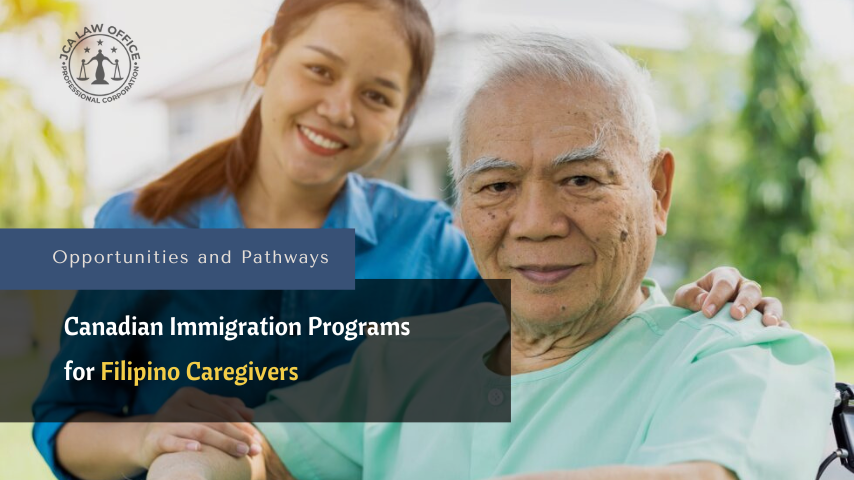Canada has long been a popular destination for Filipino caregivers seeking better opportunities and a higher quality of life. The Canadian government recognizes the significant contribution of these caregivers to the economy and society and has established several immigration programs to help them find employment and eventually obtain permanent residency. This article outlines some of the key Canadian immigration programs available for Filipino caregivers, detailing the requirements, application processes, and benefits of each program.
1. Home Child Care Provider and Home Support Worker Pilot Programs:
These two five-year pilot programs, launched in 2019, aim to provide a direct pathway for eligible caregivers to secure permanent residency in Canada. The Home Child Care Provider Pilot targets caregivers providing in-home childcare, while the Home Support Worker Pilot focuses on those offering care to the elderly or those with disabilities.
Key Features:
- Both programs allow caregivers to bring their families with them to Canada.
- Applicants must have a valid job offer from a Canadian employer.
- Caregivers receive an occupation-restricted open work permit, which allows them to switch employers without obtaining a new work permit.
- After completing 24 months (recently reduced to 12 months) of work experience within a 36-month period, caregivers can apply for permanent residency.
Eligibility Requirements:
- A genuine job offer from a Canadian employer in the relevant occupation.
- At least one year of post-secondary education, equivalent to Canadian education standards.
- Sufficient proficiency in English or French (minimum CLB/NCLC 5).
- Eligible work experience may be required, depending on the program.
2. Live-in Caregiver Program (LCP):
The Live-in Caregiver Program (LCP), although closed to new applicants since 2014, still allows those who are already working in Canada as live-in caregivers to apply for permanent residency.
Eligibility Requirements:
- Must have entered Canada through the LCP and currently working as a live-in caregiver.
- Must have completed 24 months of authorized full-time employment as a live-in caregiver within four years of arrival in Canada.
3. Provincial Nominee Programs (PNPs):
Many Canadian provinces and territories offer Provincial Nominee Programs (PNPs) with streams specifically designed for caregivers. These programs allow provinces to nominate candidates for permanent residency based on their specific labor market needs. Some popular PNPs for caregivers include:
- British Columbia: The BC PNP offers the Skills Immigration – Health Professional category for eligible healthcare professionals, including registered nurses, psychiatric nurses, and nurse practitioners.
- Alberta: The Alberta Immigrant Nominee Program (AINP) offers the Alberta Opportunity Stream, which targets workers in certain in-demand occupations, including nurse aides and orderlies.
Eligibility requirements and application processes vary depending on the specific PNP stream. Caregivers interested in these programs should consult the official websites of the relevant provinces for more information.
Conclusion:
Canada offers a variety of immigration programs for Filipino caregivers, providing them with opportunities to work, reunite with their families, and eventually become permanent residents. By understanding the different pathways available and their respective requirements, Filipino caregivers can make informed decisions about which program best suits their needs and goals.
If you need help with your immigration and legal matters, give us a call at 1-855-522-5290 or send us DM in our Facebook Page. You may also submit you inquiry here in our website.


Good day! I am interested to join in your program. I am a Filipina who had an experience as DH in Hongkong, may I know how to be part of this program? Thank you so much and more power
Hello,
I have been in Canada for almost 27 years now with my own family I built here. My husband and I are employed but we can’t sponsor a family member to come and work for us because our son is now in college. However, I have a friend who is willing to sponsor my niece as caregiver for seniors. They have already provided me with their 2022 income tax. My niece is presently working in the Philippines as a caregiver for senior with critical illness/health issues. She has graduated and obtained a certificate in caregiver program in the Philippines and studied midwifery 2013-2014 but did not finish the 2 years program during that 2 years program that was available those years
Will she be able to apply as a caregiver here in Canada with a sponsor?
Please let me know. Thank You.
My niece in the Phil. wants to apply in a caregiver program here. Does your services include the finding of an employer here?
Hi good day !I am interested to join in your program .I am a Filipina without experience .but I am willing to learn about this and part to this program …thank you so much and more power
I had finished caregiver course from Philippines, but i am here in Canada as International students taking up business course which will be finish in December 2024. Can i apply as caregiver?
Hello po. Gusto q po Sana malaman Kung paano po makapag apply ng work jan s Canada at makapgcross country po galing po dito s grand cayman islands. Gustong gusto q po mkpg Canada kaso po hindi q tlga Alam paano ang proseso at mga dapat q po gawin. Sana po matulungan nio aq mkpg apply at mkpgcross country galing po dito s grand cayman islands.
Hi I am already here in Canada on an open work permit as a dependent from my Husband who is an International student. I am a Tesda Accredited Filipina Caregiver NC II passer back in the Philippines and had worked in Ramon Durano Foundation Home for the Aged. I really wanted to apply as a caregiver here in Canada since we arrived last April 2023. Unfortunately, they told me to study caregiving course here again and take all those first aid certifications again here in Canada before they can hire me. Is there a way that I can be hired by a Canadian employer without going back studying a caregiver course?
Hi I’m 17 years already here in Canada and I got my citizenship long time ago and I’m working full-time and I’m alone here can I sponsor anyone of my niece or siblings to stay with me?
Hi, Gladys. Good day. You may qualify for a program. Please send your name, contact number, and details of your inquiry and family situation to [email protected]. Thanks! Looking forward to discuss with you.